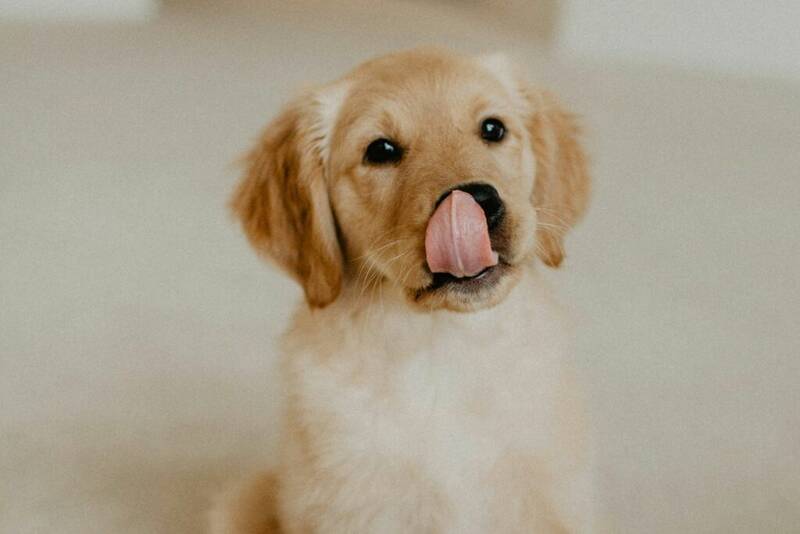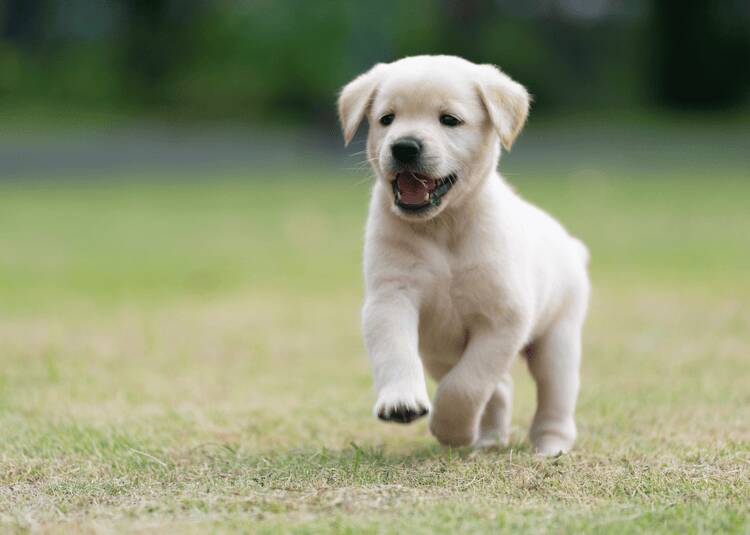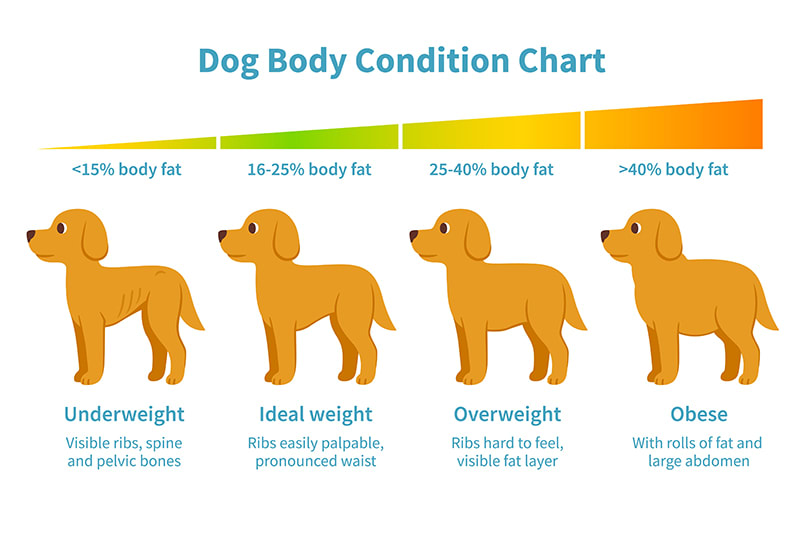If you let them feed themselves, Golden Retriever puppies will eat anything they can as much as they can. These fur babies are gluttons that munch on anything they find.
As responsible pet parents, though, we want to craft them a quality diet and ensure they eat a proper amount of food. That’s why many people come to us asking “How much food for a Golden Retriever puppy is enough?” and we will reveal the answer in this article!
Understanding the Nutritional Needs of Golden Retriever Puppies

In fact, the key to a balanced diet for Golden Retriever puppies is not how much they eat. What’s more important is to provide proper nutrition for their development. The best dog food for golden retrievers should include the right amount of calories and key nutrients crucial for their growth, immune system, and overall well-being.
Caloric Requirements for Growing Golden Retrievers
Golden Retriever puppies have specific caloric needs that vary depending on their age, size, and activity level. Providing the correct number of calories is important to support their growth without overfeeding. A veterinarian can offer guidance on the appropriate calorie intake for your Golden Retriever puppy based on their individual traits and developmental stage.
Key Nutrients: What Your Golden Retriever Puppy Needs
Golden Retriever puppies require several key nutrients to support their growth and overall health, including:
- Protein: Essential for muscle growth and repair.
- Fats: Provide energy and support brain development.
- Carbohydrates: Serve as an energy source for active puppies.
- Vitamins and minerals: Necessary for immune function and general health.
- Calcium: Important for proper bone development.
- Omega-3 Fatty Acids: Support brain development and promote healthy skin and coat.
How Much Food for Golden Retriever Puppy: Feeding Guidelines by Stage

Feeding your Golden Retriever puppy the correct amount of food is essential for their growth and development. As your puppy moves through various life stages, their nutritional requirements will shift.
For a quick reference, take a look at our Golden Retriever puppy feeding chart. We will dig deeper in a second:
| Age | Gender | Amount of Food (cups/day) | Number of Meals per Day |
| 2 months | Male & Female | 1½ | 3 |
| 3 months | Male & Female | 2 | 3 |
| 4 months | Male & Female | 2½ | 3 |
| 5-6 months | Male & Female | 3 | 3 |
| 6-7 months | Male | 3½ to 4 | 2 |
| 6-7 months | Female | 3 | 2 |
Feeding Guidelines from 8 Weeks to 3 Months
In the first few months, your Golden Retriever puppy will experience rapid growth. Offer your puppy high-quality food specifically formulated for Golden Retrievers, following the manufacturer’s feeding chart for guidance. Typically, their daily food should be divided into three meals, spaced evenly throughout the day.
Transitioning From 3 to 6 Months
Between 3 and 6 months of age, your Golden Retriever puppy will start transitioning from puppy food to adult food. This transition should be done gradually over a few weeks to avoid digestive issues.
Adjusting Food Amounts as Your Puppy Near Adulthood
As your Golden Retriever puppy gets closer to adulthood, their growth slows, and their nutritional needs change again. Between 6 and 12 months, you can gradually switch them to an adult formula designed for medium to large breeds.
Suitable Food Types for Golden Retriever Puppies

Dry Food
Dry kibble is often the most convenient and popular choice for Golden Retriever puppies. High-quality dry food formulated specifically for large-breed puppies offers several benefits. It typically contains a balanced mix of proteins, fats, and carbohydrates tailored to support rapid growth.
Wet Food
Wet food can be an excellent addition to your Golden Retriever puppy’s diet, especially for picky eaters. It often has a higher moisture content, which can help with hydration and potentially reduce the risk of urinary tract issues.
Homemade Food
Some owners prefer to prepare Golden Retriever homemade meals for their pets. While this approach allows for complete control over ingredients and quality, it requires careful planning to ensure all nutritional needs are met.
Nutritional Supplements
While a well-balanced diet should provide most of the nutrients your Golden Retriever puppy needs, some may benefit from additional supplements. Always consult with your veterinarian before adding any supplements to your puppy’s diet.
Read more >> 5 Best Foods for Golden Retriever Puppy, According to Vets
Signs of Appropriate Food Quantity
Properly nourished Golden Retriever puppies should display consistent energy levels throughout the day. They should be playful and engaged during active times but also able to settle down for rest.
Another determination is the quality of your puppy’s stool. This can provide valuable insights into their digestive health and the appropriateness of their diet. Ideal stools should be firm and well-formed, not too hard or too soft.
How to Know If My Golden Retriever Puppy Is Fat?

Source: https://www.vscot.com/
Pet obesity has always been a huge problem in the U.S. According to the Association of Pet Obesity Prevention, 59% of dogs are estimated to be overweight across the country. Fat puppies struggle with daily activities and are prone to serious conditions like heart disease, diabetes, respiratory issues, and even cancer.
Many pet parents don’t realize that their Goldies are overweight, so our veterinarians suggest some simple ways to check. Just take a look at your pup’s frame from above and see if their waist resembles an hourglass shape. If it looks more like an oval, it’s time to cut down on their meal intake. If the hourglass shape is too extreme, your pup is underweight.
Another method is to run your hands along two sides of your pup’s chest. Normally, you can feel their ribs under a thin fat layer. If the fat layer is too thick that it’s difficult to feel the ribs, your dog is at risk of piling on the pounds to become obese. If the ribs are highly visible without even touching, they are emaciated and need to put on much more weight.
Expert Advice and Health Monitoring
Importance of Consulting a Veterinarian
Consulting with a veterinarian is crucial for your Golden Retriever puppy’s health and nutrition. Your vet can provide personalized advice based on your puppy’s specific needs, health status, and growth rate.
Regular Weight and Health Check-ups
Regular check-ups are essential for monitoring your puppy’s growth and overall health. Aim for check-ups every 3-4 weeks during the first few months, then every 6-12 months once your puppy reaches adulthood.
Adjusting Diet When Necessary
As your Golden Retriever puppy grows, their nutritional needs will change. Be prepared to adjust your diet based on growth rate, body condition, activity level, and health status.
Conclusion
We all love to watch our little companions enjoy a hearty meal or a delicious treat. However, it’s more important to know the limits and offer them an appropriate diet that best suits their development.
With our guide on how much to feed Golden Retriever puppies, you can ensure you start them off right. By following these feeding tips, you will help your puppy grow strong and healthy without overindulging. After all, a well-fed puppy is a happy puppy!

With years of expertise as a pet care writer, I’ve acquired a specific interest in Golden Retrievers, who are one of the most popular and beloved dog breeds. Although I do not own a Golden Retriever, my extensive study and talks with pet professionals enable me to offer useful and reliable articles for dog owners. My work on this website covers important areas such as diet, grooming, and training for Golden Retrievers. My goal is to provide readers with the information they need to keep their dogs healthy and happy.

